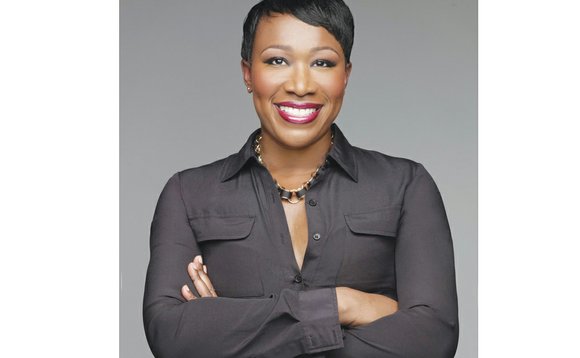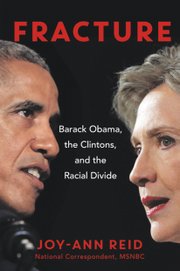A conversation with Joy-Ann Reid
Clinton has work to do to win black voters
10/30/2015, 9:03 p.m.
By Jack White
As a national correspondent for MSNBC, Joy-Ann Reid has a commanding front row seat from which to observe the battle for the White House. Her savvy insights into the twists and turns of the campaign are on display in “Fracture: Barack Obama, the Clintons and the Racial Divide,” Ms. Reid’s newly published book.
In it, Ms. Reid traces the fraught relationship between African-Americans and the Democratic Party by likening it to the sometimes fractious, sometimes friendly bond between President Obama and former Secretary of State Hillary Clinton, the Democratic front-runner who could become the nation’s first female chief executive.
Ms. Reid contends that the biggest challenge facing Mrs. Clinton if she becomes the Democrats’ standard-bearer will be “managing and shaping the party’s demographic future” as African-Americans, Latinos and other racial minorities increasingly demand that their would-be leaders confront racially loaded issues from police brutality to disparities in wealth and income.
In a recent interview, Ms. Reid answered questions from the Free Press about what to watch for as the campaign heats up.
RFP: What has surprised you most about the way the presidential nominating battle has unfolded since “Fracture” was published?
Ms. Reid: What has, frankly, surprised me most is the extent to which the Democratic nominating contest launched with almost no sensitivity to the issue of race. Less than eight years since the start of the Obama era, with all of the racial stratification that the election and subsequent tensions laid bare, and with Black Lives Matter emerging as the most prominent Civil Rights Movement in decades, the Democrats emerged as an entirely white group of nominees, all of whom seemed tone deaf, initially, on the issues that matter most to the party’s most loyal and consistent base.
RFP: Given that, will black voters turn out as they did for President Obama?
Ms. Reid: That is the million dollar question. Democrats need black turnout to be robust if they want to win. But so far, the energy in the nominating process has been among white liberals who, by themselves, cannot guarantee the next president is a Democrat. So the Democrats will have to recalibrate their campaigns to accommodate this reality: Black voters will demand to hear a clear platform, and they will need to be activated. Democrats are going to have to work at getting the turnout they need.
RFP: How do you account for the strength of Donald Trump and Dr. Ben Carson on the Republican side?
Ms. Reid: I see the Trump and Carson phenomena as direct reactions to the Obama moment. Mr. Trump, in my view, embodies the anger, frustration and sense of being “left behind” that roils some white working-class voters who feel marginalized in the multicultural “New America” that President Obama represents. In many ways, Dr. Carson is the alternate universe Obama, and I suspect there are some in the conservative movement who yearn to have their own version of the historic high of electing a black president — but one who treats race in the way conservatives want it treated — as a thing to put aside and overcome, not a thing to litigate.
RFP: What accounts for the strength of U.S. Sen. Bernie Sanders on the Democratic side?
Ms. Reid: Sen. Sanders is actually the physical manifestation of one of the phenomena I describe in “Fracture.” When Barack Obama came along, the left decided it was done with compromise and pushed back hard on issues from health care to gay rights. They won some — notably same-sex marriage and open military service — and they lost some — the public option in Obamacare. But on one issue, they see in Sen. Sanders a chance to fight again — the fight to tame Wall Street.
RFP: What is President Obama’s legacy on the racial politics of America?
Ms. Reid: I think President Obama will have a large and complex legacy as president. On racial matters, his trajectory will be his legacy — as a president who came into office hoping to make race incidental to his leadership, but who left office fully aware that however high his rise, he cannot escape the burden of representation that comes with being a black man in America.
RFP: What is the impact of the Black Lives Matter movement on the campaign?
Ms. Reid: Black Lives Matter already has shaken up the campaigns of the three major Democratic nominees, Mrs. Clinton, Sen. Sanders and former Maryland Gov. Martin O’Malley. The failure of those campaigns to recognize the gravity of the movement initially was shocking, given Democrats’ significant reliance on black voters. And the movement is still forcing the campaigns to reckon with the ongoing hurt and fear of a community Democrats must engage in order to win. The question is will Democrats get beyond simply repeating the phrase “Black Lives Matter” and actually engage black voters about concerns that go beyond policing?
RFP: Will Mrs. Clinton’s strategy for rallying strong African-American and Latino support while attracting sufficient numbers of white voters succeed?
At this point, Mrs. Clinton’s strategy for rallying black voters has been curious. She has fielded surrogates from the Congressional Black Caucus and most recently, black mayors, just as she did in 2008. But we have not seen her campaign mount the kind of sustained and vigorous engagement with the mass of black voters that she will likely need in order to win a general election. Having key validators from black public and cultural life outside of black politicians is something I would look for as the campaign goes on.








